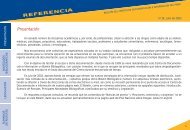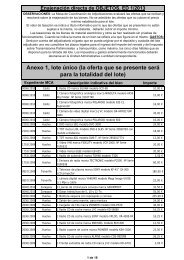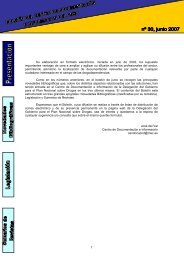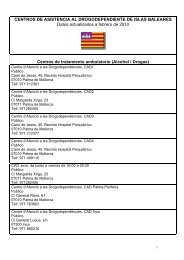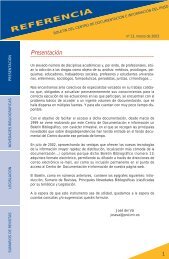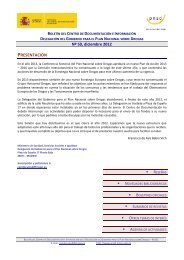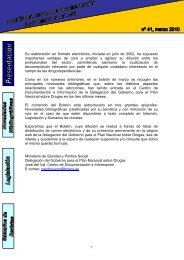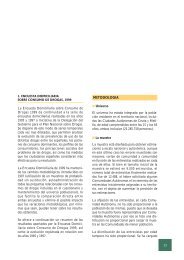MonografÃa Tabaco - Plan Nacional sobre drogas
MonografÃa Tabaco - Plan Nacional sobre drogas
MonografÃa Tabaco - Plan Nacional sobre drogas
Create successful ePaper yourself
Turn your PDF publications into a flip-book with our unique Google optimized e-Paper software.
<strong>Tabaco</strong> y esquizofrenia<br />
JOSÉ MARÍA MARTÍNEZ ORTEGA*; MANUEL GURPEGUI*; FRANCISCO J. DÍAZ**;<br />
JOSÉ DE LEON***<br />
* Departamento de Psiquiatría, Facultad de Medicina e Instituto de Neurociencias, Universidad de Granada, Granada, España.<br />
** Departamento de Estadística, Universidad <strong>Nacional</strong>, Medellín, Colombia.<br />
*** Mental Health Research Center at Eastern State Hospital, Universidad de Kentucky, Lexington, EEUU.<br />
Enviar correspondencia a: Dr. Manuel Gurpegui, Depto. de Psiquiatría, Facultad de Medicina, Av. Madrid 11, E-18071 Granada.<br />
Tel . 958 240 704. Fax 958 246187. E-mail: gurpegui@ugr.es.<br />
RESUMEN<br />
Numerosos estudios en distintos países demuestran<br />
repetidamente una asociación significativa entre la<br />
esquizofrenia y el fumar tabaco, relativamente independiente<br />
de factores socioculturales. En comparación con<br />
los fumadores de la población general, los fumadores<br />
con esquizofrenia presentan más frecuentemente una<br />
alta dependencia nicotínica; pero en esto la esquizofrenia<br />
no se distingue de otras enfermedades mentales<br />
graves. La elevada prevalencia de “alguna vez<br />
fumadores” entre los pacientes con esquizofrenia y el<br />
predominio del inicio del fumar antes del diagnóstico<br />
sugieren que quienes van a presentar esquizofrenia<br />
tienen mayor vulnerabilidad para comenzar a fumar. El<br />
efecto reforzante de la nicotina podría ser explicado por<br />
la liberación de dopamina, lo que permite enlazar con<br />
la teoría dopaminérgica de la esquizofrenia. Los hidrocarburos<br />
aromáticos policíclicos del humo del tabaco<br />
aumentan el metabolismo de la clozapina, la olanzapina<br />
y los antipsicóticos típicos. Algunos estudios, con<br />
pequeñas muestras, sugieren que los antipsicóticos<br />
típicos se asocian a mayor intensidad en el fumar y a<br />
dificultad para dejar de fumar; y que la clozapina se asocia<br />
a modestas disminuciones en el fumar. La hipótesis<br />
de la automedicación en la esquizofrenia propone que<br />
el fumar podría tener efectos cognitivos beneficiosos y<br />
reducir síntomas depresivos, ansiosos y psicóticos, así<br />
como reducir los efectos secundarios de los antipsicóticos<br />
y favorecer la interacción social; pero los estudios<br />
clínicos no parecen demostrar esos supuestos efectos<br />
beneficiosos. Conviene que los clínicos tengan un planteamiento<br />
flexible, de modo que, si la abstinencia no es<br />
posible, el objetivo pueda ser la reducción del fumar.<br />
Palabras clave: esquizofrenia, tabaco, nicotina, fumar.<br />
SUMMARY<br />
Many studies across different countries demonstrate<br />
consistently an association between schizophrenia<br />
and current smoking. This association is relatively<br />
independent of sociocultural factors. Schizophrenia is<br />
found to be associated with high nicotine dependence<br />
when schizophrenic smokers are compared with<br />
smokers from the general population, but not when they<br />
are compared with smokers with other severe mental<br />
illnesses. The increased prevalence of ever smoking in<br />
schizophrenic patients and the higher rates of smoking<br />
initiation before schizophrenia starts suggest that people<br />
who are going to develop schizophrenia have some risk<br />
factors that make them more vulnerable to start smoking.<br />
The reinforcing nicotine properties may be associated<br />
with dopamine release, which may allow to make links<br />
with the dopamine hypothesis of schizophrenia. The<br />
polycyclic aromatic hydrocarbons in tobacco smoke are<br />
metabolic inducers of clozapine, olanzapine and typical<br />
antipsychotics. Limited and small studies suggest that<br />
typical antipsychotics may increase smoking and make<br />
it difficult to quit smoking, while clozapine treatment<br />
is associated with small smoking decreases. The selfmedication<br />
hypothesis in schizophrenia proposes that<br />
smoking would improve cognition, decrease depressive,<br />
anxious and positive symptoms, decrease antipsychotic<br />
side effects, and favor psychosocial interaction; but<br />
clinical studies do not appear to demonstrate these<br />
allegedly beneficial effects. Clinicians trying to help<br />
patients with schizophrenia quit smoking need to be<br />
flexible, so that if abstinence is not possible smoking<br />
reduction can be an appropriate goal.<br />
Key words: schizophrenia, tobacco, nicotine,<br />
smoking.<br />
ADICCIONES (2004), VOL. 16, SUPL. 2<br />
177



